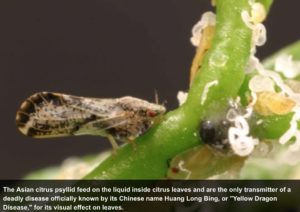
An innocuous insect that carries a devastating disease which has destroyed citrus groves in Africa and South America has arrived in San Francisco.
The Asian citrus psyllid has been found in the Marina district and the California Department of Food and Agriculture is making anyone with citrus trees on their property to avoid moving fruit and plants.
“The insect isn’t the real reason growers are worried. The psyllid (pronounced SILL-id) is a small, winged, brown-speckled insect. It likes to eat young citrus leaves and is mostly a nuisance. But it can carry the world’s most damaging citrus disease called Huang Long Bing, or Yellow Dragon Disease. There is no risk to humans who eat the fruit, but it is hugely destructive to citrus groves. HLB-infected trees produce bitter, misshapen fruit and finally die. It first showed up in southern China in the late 1890s. It has since spread throughout Asia, Africa, the Arabian Peninsula and Brazil, devastating citrus production in those areas.”
To read about the psyllid’s first appearance on the West coast, you can read this story from 2012.
Here’s a report from the University of California about the damage it can do to citrus trees and fruits.
And here’s todays’ release from CDFA:
ASIAN CITRUS PSYLLID DETECTED IN SAN FRANCISCO
SACRAMENTO, January 16, 2019 – The California Department of Food and Agriculture, working in cooperation with the San Francisco Department of Public Health’s Agriculture Program, has placed San Francisco County under a plant pest quarantine for the Asian citrus psyllid (ACP) following the detection of one ACP in San Francisco’s Marina District. The quarantine is a regulatory program designed to limit the artificial movement of ACP host plants, thereby isolating the insect and stopping the spread of the pest. A map is available online at: https://www.cdfa.ca.gov/plant/acp/regulation.html.
Residents with backyard citrus trees in San Francisco are asked not to transport or send citrus fruit or leaves, potted citrus trees, or curry leaves from the quarantine area. For commercial concerns in San Francisco, the quarantine prohibits the movement of citrus and curry leaf-tree nursery stock, including all plant parts except fruit, out of the quarantine area, and the regulations require that all citrus fruit be cleaned of leaves and stems prior to moving out of the quarantine area.
The ACP is an invasive species of grave concern because it can carry the bacteria that causes the disease Huanglongbing (HLB) and can transmit the disease to host plants. All citrus – including oranges, mandarins, lemons, kumquats, pomelos, and limes, and related plants, such as curry leaf trees, are susceptible hosts for both the insect and disease. There is no cure once a tree becomes infected with HLB. The diseased tree will decline in health, produce bitter, misshapen fruit, and eventually die. In California, HLB has been detected at residential properties in Los Angeles, Orange, and Riverside Counties. This plant disease does not affect human health.
ACP quarantines are already in place in 27 California counties. Residents in the area who think they may have seen ACP or symptoms of HLB on their trees are urged to call CDFA’s Pest Hotline at 1-800-491-1899 or their local San Francisco County Agricultural Commissioner at 415-252-3830. For more information on ACP and HLB, please visit: www.cdfa.ca.gov/go/acp.
Residents are urged to follow these steps:
- Inspect trees for the Asian citrus psyllid and Huanglongbing symptoms monthly, and whenever watering, spraying, pruning, or tending trees. Psyllids are most noticeable when new leaves are growing on the tips of the branches.
• As part of your tree care, visit your local nursery or garden center to get advice on products that can help protect your citrus tree.
• Do not move citrus plants, foliage, or fruit into or out of your area, and especially across state or international borders. This could unknowingly contribute to the spread of the pest and disease.
• When planting a new citrus tree, be sure to get your tree from a reputable, licensed nursery in your local area.
• Cooperate with agriculture crews that are working in the area to find and stop the disease. Please allow them to access your property.
• When grafting citrus trees, only use registered budwood with accompanying source documentation, such as the budwood offered through the Citrus Clonal Protection Program.
• Be sure to dry out citrus tree clippings or double bag them before removing them from the property.
While ACP and other invasive species that threaten California’s crops and natural environment are sometimes detected in agricultural areas, the vast majority are found in urban and suburban communities. The most common pathway for these invasive species to enter our state is by “hitchhiking” in fruits and vegetables brought back illegally by travelers as they return from infested regions of the world. To help protect California’s agriculture and natural resources, CDFA urges travelers to follow the Don’t Pack a Pest program guidelines (www.dontpackapest.com).